牛津版 Module 1 Unit1 单词用法
- 格式:ppt
- 大小:1.12 MB
- 文档页数:36
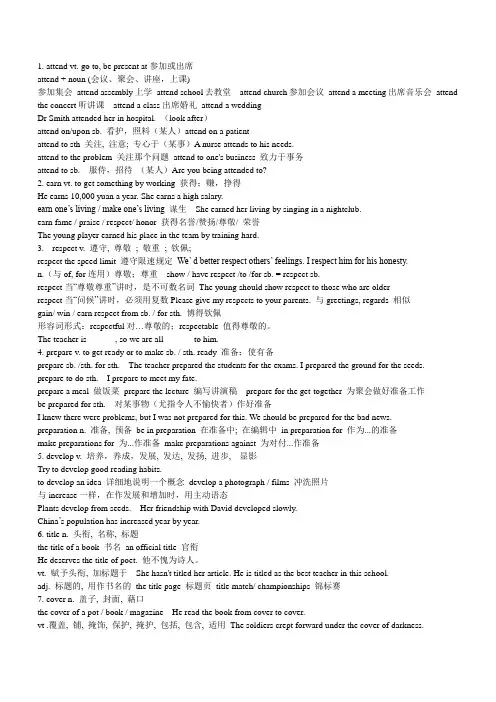
1. attend vt. go to, be present at参加或出席attend + noun (会议、聚会、讲座,上课)参加集会attend assembly上学attend school去教堂attend church参加会议attend a meeting出席音乐会attend the concert听讲课attend a class出席婚礼attend a weddingDr Smith attended her in hospital. (look after)attend on/upon sb. 看护,照料(某人)attend on a patientattend to sth 关注, 注意; 专心于(某事)A nurse attends to his needs.attend to the problem 关注那个问题attend to one's business 致力于事务attend to sb. 服侍,招待(某人)Are you being attended to?2. earn vt. to get something by working 获得;赚,挣得He earns 10,000 yuan a year. She earns a high salary.earn one’s living / make one’s living 谋生She earned her living by singing in a nightclub.earn fame / praise / respect/ honor 获得名誉/赞扬/尊敬/ 荣誉The young player earned his place in the team by training hard.3.respect v. 遵守, 尊敬; 敬重; 钦佩;respect the speed limit 遵守限速规定We’ d better respect others’ feelings. I respect him for his honesty.n.(与of, for连用)尊敬;尊重show / have respect /to /for sb. = respect sb.respect当“尊敬尊重”讲时,是不可数名词The young should show respect to those who are olderrespect当“问候”讲时,必须用复数Please give my respects to your parents. 与greetings, regards 相似gain/ win / earn respect from sb. / for sth. 博得钦佩形容词形式:respectful对…尊敬的;respectable 值得尊敬的。
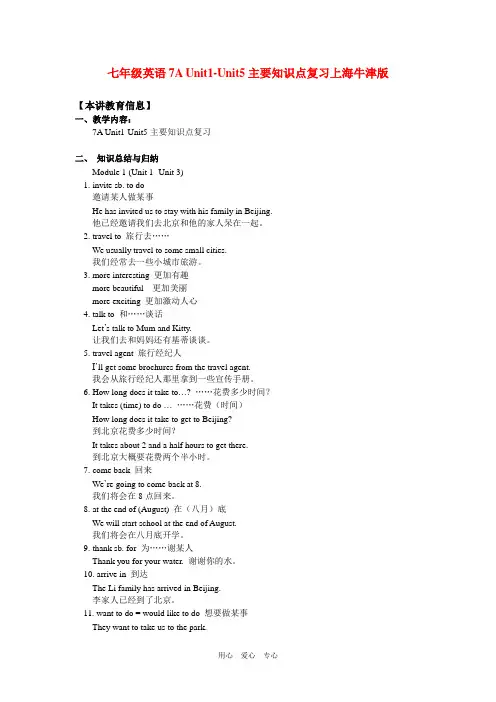
七年级英语7A Unit1-Unit5主要知识点复习上海牛津版【本讲教育信息】一、教学内容:7A Unit1-Unit5主要知识点复习二、知识总结与归纳Module 1 (Unit 1- Unit 3)1. invite sb. to do邀请某人做某事He has invited us to stay with his family in Beijing.他已经邀请我们去北京和他的家人呆在一起。
2. travel to 旅行去……We usually travel to some small cities.我们经常去一些小城市旅游。
3. more interesting 更加有趣more beautiful 更加美丽more exciting 更加激动人心4. talk to 和……谈话Let’s talk to Mum and Kitty.让我们去和妈妈还有基蒂谈谈。
5. travel agent 旅行经纪人I’ll get some brochures from the travel agent.我会从旅行经纪人那里拿到一些宣传手册。
6. How long does it take to…? ……花费多少时间?It takes (time) to do ………花费(时间)How long does it take to get to Beijing?到北京花费多少时间?It takes about 2 and a half hours to get there.到北京大概要花费两个半小时。
7. come back 回来We’re going to come back at 8.我们将会在8点回来。
8. at the end of (August) 在(八月)底We will start school at the end of August.我们将会在八月底开学。
9. thank sb. for 为……谢某人Thank you for your water. 谢谢你的水。
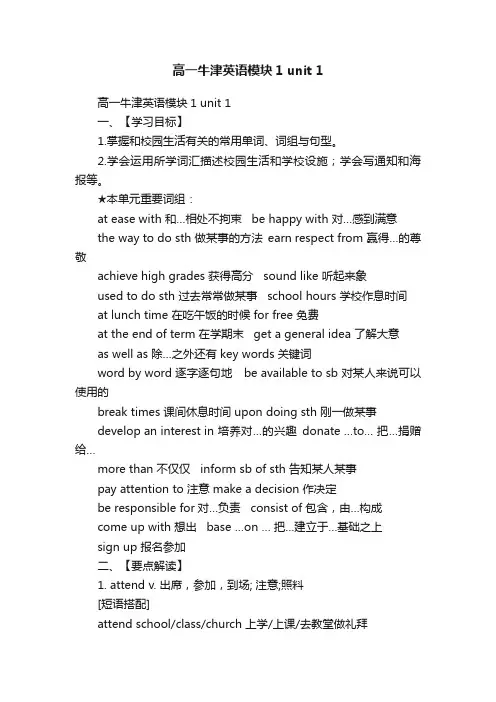
高一牛津英语模块1 unit 1高一牛津英语模块1 unit 1一、【学习目标】1.掌握和校园生活有关的常用单词、词组与句型。
2.学会运用所学词汇描述校园生活和学校设施;学会写通知和海报等。
★本单元重要词组:at ease with 和…相处不拘束 be happy with 对…感到满意the way to do sth 做某事的方法earn respect from 赢得…的尊敬achieve high grades 获得高分 sound like 听起来象used to do sth 过去常常做某事 school hours 学校作息时间at lunch time 在吃午饭的时候 for free 免费at the end of term 在学期末 get a general idea 了解大意as well as 除…之外还有 key words 关键词word by word 逐字逐句地be available to sb 对某人来说可以使用的break times 课间休息时间 upon doing sth 刚一做某事develop an interest in 培养对…的兴趣donate …to…把…捐赠给…more than 不仅仅 inform sb of sth 告知某人某事pay attention to 注意 make a decision 作决定be responsible for对…负责 consist of 包含,由…构成come up with 想出 base …on…把…建立于…基础之上sign up 报名参加二、【要点解读】1. attend v. 出席,参加,到场; 注意;照料[短语搭配]attend school/class/church 上学/上课/去教堂做礼拜attend a meeting/lecture/wedding/ 参加会议/听讲座/参加婚礼attend to sb/sth 注意;倾听;专心干;照料,处理attend (on/upon) sb 伺候/照顾某人[典型例句]He'll attend an important meeting tomorrow.他明天要参加一个重要的会议。
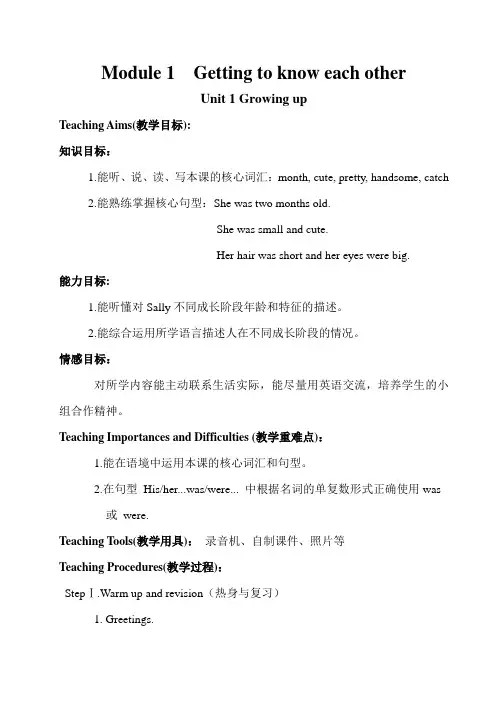
Module 1 Getting to know each otherUnit 1 Growing upTeaching Aims(教学目标):知识目标:1.能听、说、读、写本课的核心词汇:month, cute, pretty, handsome, catch2.能熟练掌握核心句型:She was two months old.She was small and cute.Her hair was short and her eyes were big.能力目标:1.能听懂对Sally不同成长阶段年龄和特征的描述。
2.能综合运用所学语言描述人在不同成长阶段的情况。
情感目标:对所学内容能主动联系生活实际,能尽量用英语交流,培养学生的小组合作精神。
Teaching Importances and Difficulties (教学重难点):1.能在语境中运用本课的核心词汇和句型。
2.在句型His/her...was/were... 中根据名词的单复数形式正确使用was或were.Teaching Tools(教学用具):录音机、自制课件、照片等Teaching Procedures(教学过程):StepⅠ.Warm up and revision(热身与复习)1. Greetings.2. Do some warming-up exercises.3. Review the numbers.Step Ⅱ.Presentation and practice(呈现新语言知识和练习)1. Lead in.T: How old are you?S1: I’m eleven years oldT: You’ll be twelve years old next year. You’re growing up.2. Show some photos and introduce the new words.3. Learn to say and use the words.4. Talk about the photos of Sally.5. Watch the screen and learn to say the sentences.6. Ask pupils to practise in groups.Sept Ⅲ. Learn the story (学习课文)1. Read the story and learn to say the useful sentences.2. Watch the cartoon.Unit 7 Helping others◆教材分析Understand the ideographic functions of different tenses through the situational dialogue of Listen and say. Talk about how to help others.◆教学目标【知识目标】Through the teaching activities of Look and learn, read new words and review the same words in front of them.【能力目标】Help students practice different tenses through the activities of Ask and answer【情感目标】Guide students to realize that helping others is also the source of their own happiness.◆教学重难点【教学重点】Sentence:How can you help others? I can...【教学难点】Help students to practice different tenses.◆课前准备Tape recorder, Multimedia◆教学过程Step 1. Listen and enjoyLead students enjoy and sing along with the tape and know the topic of this Unit.Step 2. Think and discuss1)Did you ever help other people?Did anyone help you before?How do you feel when you help other people?Why do people help each other?Step 3. Ask and answer◆Talk about how to help others in your daily life.help the blind cross the streetpick up rubbish (sweep the floor)read the newspaper to old peoplegive seats to those in need (old people/ the disabled/pregnantwomen/the sick)help tourists find their way◆Make a short dialogueStep 4. Listen and say1) Look and predict: What’s happening in the picture?2) read and answer1. Where are they?2. Why is the boy crying?3. What does the lost dog look like? (explain the new words in Look and learn)4. how did they help the boy?3) Read and fill in the table.Sally and peter cannot find the dog? Please complete the notice about a lost dog.4) read aloud and act it out.Step 5. Read a story1)Read and guess◆I am an insect. I am small and yellow. I fly among flowers.I have a sting on my tail. What am I?◆I am an insect. I am small and black.I live in a nest under the ground.Do you know me?2) Read and answer the questions in page 45.3) Think and answer◆Why do people like the bee instead of the ant?Because the bee works for flowers and people while the ant only works for himself and his queen.◆What do you think of the ant and the bee?◆Do you have any suggestions for the ant?Don’t be selfish.Work for people and plants.Do good things for others.4)Talk and shareWhat do you learn from the story?A selfish person cannot earn people’s respect.Helping other people makes you popular.A kind heart is better than a smart mind.Step 6. Learn the sounds1)Show the flashcards of words in this part and lead students read aloud.2)Find out the rules of pronunciations.Step 7. HomeworkRead the dialogue in Listen and say. Retell the story in Read a story.。
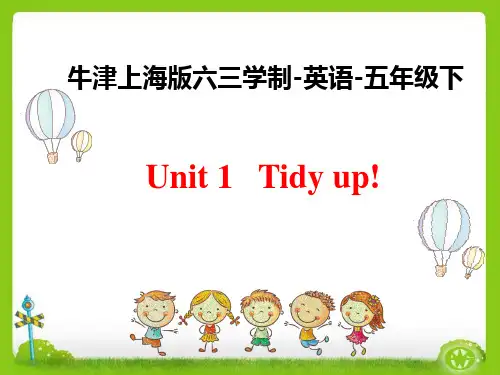

致易教育个性化指导教课方案五年级上册课本知识点梳理Module1 Unit1一,核心词汇1.first 第一2.second第二3.third 第三4.fourth 第四5.fifith 第五6.sixth 第六7.party 派对,聚会8.begain 开始9.bring 带来 10.wear 穿着 11.favourite 最喜欢的二,词组1.at Peter’ s birthday在partyPeter的寿辰聚会上2.on the 19th of September在 9 月 19 日3. on Sunday在周日4.at two o’clock在两点5. in the afternoon在下午6. at night 在夜晚7. sb. be tired某人很累8. my favourite color 我最喜欢的颜色9. That sounds interesting那.听上去幽默10. I can’t wait!我等不及了!11. Happy Birthday! 寿辰快乐12.Welcome to my party. 欢迎来我的派对13.a pair of orange trousers一条橙色的裤子14.make a birthday invitation 制作一张寿辰请帖15. make a hat制作一顶帽子16. have some fun过得快乐17.birthday present寿辰礼物三,词汇讲解1.bring,take,carry 辨析bring 是指把人或物从别处带到说话人所在的地方。
比方:Bring me some water, please请.给我取点水来。
carry 及物动词,“搬运,运送”,一般是指搬运较重的物品。
比方:carry a box on one’ s shoulder扛着箱子carry a baby on one’背s着back孩子“携带,带”比方:Almost every teacher carries a watch差.不多每位教师都带着一只表。
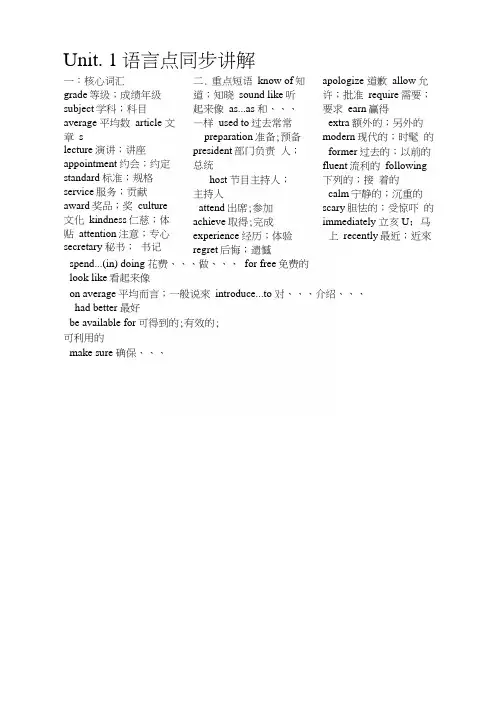
Unit. 1语言点同步讲解一:核心词汇grade等级;成绩年级subject学科;科目average 平均数article 文章slecture演讲;讲座appointment约会;约定standard标准;规格service服务;贡献award奖品;奖culture 文化kindness仁慈;体贴attention注意;专心secretary 秘书;书记二.重点短语know of知道;知晓sound like听起来像as...as 和、、、—样used to过去常常preparation准备;预备president部门负责人;总统host节目主持人;主持人attend出席;参加achieve取得;完成experience经历;体验regret后悔;遗憾apologize 道歉allow允许;批准require需要;要求earn赢得extra额外的;另外的modern现代的;时髦的former过去的;以前的fluent流利的following下列的;接着的calm宁静的;沉重的scary胆怯的;受惊吓的immediately 立亥U;马上recently最近;近來spend...(in) doing 花费、、、做、、、for free免费的look like看起来像on average平均而言;一般说來introduce...to 对、、、介绍、、、had better 最好be available for可得到的;有效的;可利用的make sure 确保、、、三.句型It was difficult to remember all the faces and names.I was glad that•…What is your dream school life like? They dorTt seem to do …I would like to do /be...be of+抽象名词四.定语从句We like the team who were wearing green.The trees which are on the school campus lost their leaces.五.知识点♦ Read a magazine article about school life in the UK and two other articles about拓展:another 3 days =3 other days =3 more daysone after the other =one after another 一个接一个地one anther彼此,互相school clubs.two other articles另外两篇文章Tom still has three other questions to ask..The job is hard .We will need five other days to finishit.We achieved victory one after the other.We must help one anthe匚♦ 2.Do you know of any other differences between the lives of Chinese and British♦high school students?China is known for its long history.He is the best student in our school. He is known to us all.As a great scientist, Einstein was known throughout the world.know of sb/sth知道某人或某事物的情况be known to sb为某人所熟知be known for因为八、而闻名be known as作为、、、而闻名♦ 3.This means I could get up an hour later than usual as schools in China begin before 8 a.m. a.mean意味,意欲,打算mean+n/pron/to do /sb to do /that clauseHe said Tuesday, but he mean Thursday.他说的是周二,口J他的意思是周四。
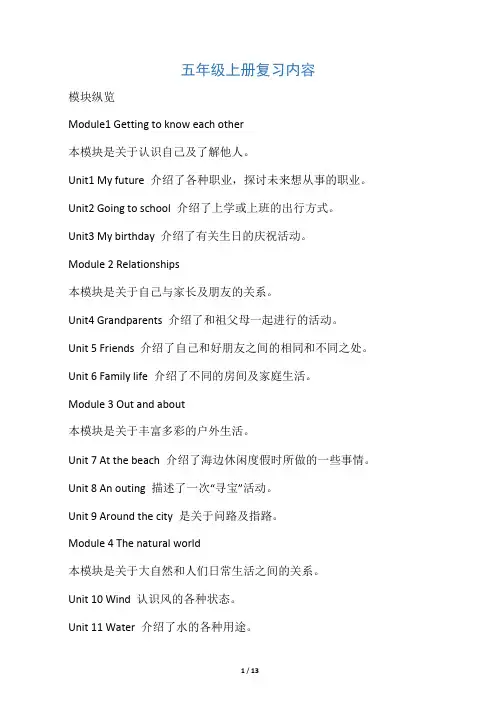
五年级上册复习内容模块纵览Module1 Getting to know each other本模块是关于认识自己及了解他人。
Unit1 My future 介绍了各种职业,探讨未来想从事的职业。
Unit2 Going to school 介绍了上学或上班的出行方式。
Unit3 My birthday 介绍了有关生日的庆祝活动。
Module 2 Relationships本模块是关于自己与家长及朋友的关系。
Unit4 Grandparents 介绍了和祖父母一起进行的活动。
Unit 5 Friends 介绍了自己和好朋友之间的相同和不同之处。
Unit 6 Family life 介绍了不同的房间及家庭生活。
Module 3 Out and about本模块是关于丰富多彩的户外生活。
Unit 7 At the beach 介绍了海边休闲度假时所做的一些事情。
Unit 8 An outing 描述了一次“寻宝”活动。
Unit 9 Around the city 是关于问路及指路。
Module 4 The natural world本模块是关于大自然和人们日常生活之间的关系。
Unit 10 Wind 认识风的各种状态。
Unit 11 Water 介绍了水的各种用途。
Unit 12 Fire 介绍了一些基本的防火知识。
第一单元复习词组Jump into the lake fly a plane cook nice food(be)afraid of flying help people drive a taxi(be)good at...句型用What do you want to be ?询问对方将来想从事的职业。
用I want to be ...及I want to (do)...介绍自己未来想从事的职业及理由。
难点1)当句子主语为第三人称单数时,动词要做适当的变化。
2)want to do 与want to be 的正确用法。
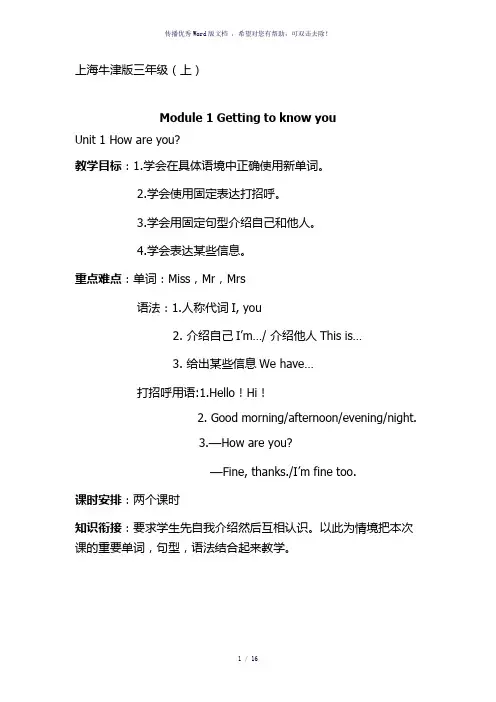
上海牛津版三年级(上)Module 1 Getting to know youUnit 1 How are you?教学目标:1.学会在具体语境中正确使用新单词。
2.学会使用固定表达打招呼。
3.学会用固定句型介绍自己和他人。
4.学会表达某些信息。
重点难点:单词:Miss,Mr,Mrs语法:1.人称代词I, you2. 介绍自己I’m…/ 介绍他人This is…3. 给出某些信息We have…打招呼用语:1.Hello!Hi!2. Good morning/afternoon/evening/night.3.—How are you?—Fine, thanks./I’m fine too.课时安排:两个课时知识衔接:要求学生先自我介绍然后互相认识。
以此为情境把本次课的重要单词,句型,语法结合起来教学。
Unit 2 what’s your name?教学目标:1.学会在具体语境中使用关键词和短语。
2.学会用固定表达说出某人的名字。
3.学会使用祈使句做出指示。
重点难点:单词:stand up, sit down, open, close, door, name,book, write日常表达:--what’s your name?--my name is…语法:1人称代词your, my2 祈使句 stand up,sit down,look at课时安排:两个课时知识衔接:上节课大家互相认识了,这节课可以以上节课的内容过渡到询问名字。
Unit 3 how old are you?教学目标:1.学会用wh-questions询问别人的年龄。
2.学会用固定句型谈论别人的年龄。
3.学会询问特定信息。
4.学会表达祝福。
重点难点:单词:one—ten,today日常表达:问年龄-- how old are you?happybirthday!--here you are--thank you. Guess!语法1.数字one—ten2. it’s …/I’m…3.物主代词your4. Are you…?5.祈使句blow…和定冠词the课时安排: 2个课时。
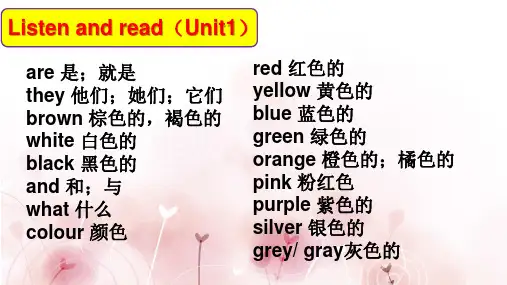
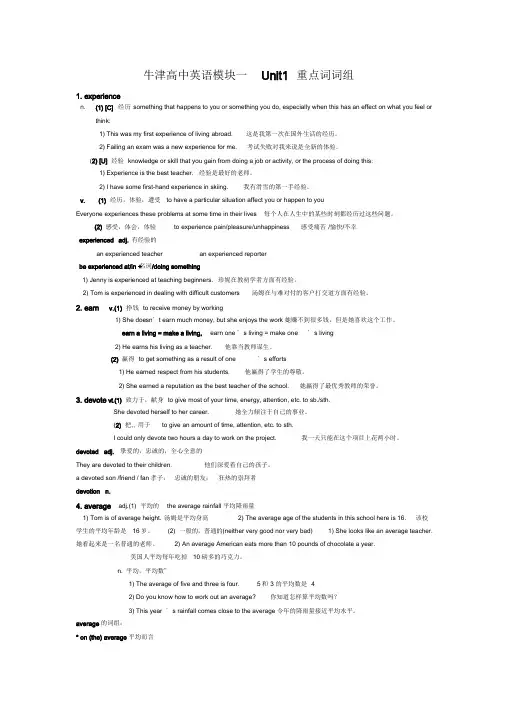
牛津高中英语模块一Unit1 重点词词组1. experiencen. (1) [C] 经历something that happens to you or something you do, especially when this has an effect on what you feel or think:1) This was my first experience of living abroad. 这是我第一次在国外生活的经历。
2) Failing an exam was a new experience for me. 考试失败对我来说是全新的体验。
(2) [U] 经验knowledge or skill that you gain from doing a job or activity, or the process of doing this:1) Experience is the best teacher. 经验是最好的老师。
2) I have some first-hand experience in skiing. 我有滑雪的第一手经验。
v. (1) 经历,体验,遭受to have a particular situation affect you or happen to youEveryone experiences these problems at some time in their lives 每个人在人生中的某些时刻都经历过这些问题。
(2) 感受,体会,体验to experience pain/pleasure/unhappiness 感受痛苦/愉快/不幸experienced adj. 有经验的an experienced teacher an experienced reporterbe experienced at/in +名词/doing something1) Jenny is experienced at teaching beginners. 珍妮在教初学者方面有经验。
Module 1 People and placesUnit 1 Peopl e around usReadingMy grandmaMy grandma was a shout woman with grey hair. She wasalways cheerful. She was a very good cook. Her disheswere probably the best in the world! I will never forget thetaste, and the smell as well.Grandma took care of my family. She was really kind andpatient. She died two years ago and I miss her very much.AliceAlice is my best friend. She is a tall girl with glasses. She often tells me jokes to make me laugh, but she never makes fun of others.Alice is a smart girl . She is good at Maths. We often study and play table tennis together. I hope we will always remain friends.----Joyce Mr LiMr Li is my Maths teacher. He is tall and thin. His classes are always full of fun. He uses lots of games in his teaching.Mr Li is strict about our studies, but he always encourages us and gives us support. He often says, “Never give up and you’ll be successful.”重点单词的讲解。
沪教版四年级英语下册(上海牛津4B)知识点总结知识点总结单词表Module 1 Using my five sensesU 1Touch and feeltouch碰;触摸XXX摸起来;感到soft柔软的hard坚硬的thick厚的;粗的XXX薄的;细的blind瞎的;失明的noise响声;吵闹声young年轻的U 2Smell andXXXsmell闻;嗅strawberry草莓or或者;还是watermelon西瓜grape葡萄fox狐狸round圆的purple紫色的wait期待;等待minute一会儿;分钟get得到those那些U 3Look and see rise升起shadow影子noon中午high高的sky天空evening薄暮;早晨XXX再;又night夜晚moon月亮him他stop停下XXX在中午go down落下XXX在夜晚take a walk漫步Module 2 My favourite things U 4 Subjectssubject学科;科目lesson课Chinese(学科)语文U5 Sportsport体育运动football足球XXX;兴趣小组U 6 Musicwonderful使人愉快的violin小提琴guitar吉他Maths(学科)数学English(学科)英语Science(学科)科学PE(学科)体育Music(学科)音乐Art(学科)美术timetable课程表;时间表from从;来自a.m.上午p.m.下午break休息from…to…从…到…XXX参加;加入tell告诉about关于basketball篮球volleyball排球us我们XXX乒乓球运动play football踢足球play XXX打篮球play volleyball打排球whose谁的piano钢琴city城市bag袋子gold金子all一切;以是play the XXX琴play the guitar弹吉他Module 3 My colourful life Unit 7 My dayo’clock …点钟XXX一刻钟time工夫half一半wash洗dinner晚饭;正餐start入手下手catch抓住get up起床Unit 8 Days of the week week星期XXXwith和…….一同XXX礼拜二XXX星期三XXX星期四XXX礼拜五game游戏XXX星期六Unit 9 XXX inAustraliaChina中国XXX说话May蒲月XXX六月January一月XXXMarch三月April四月XXX七月XXX…XXX 刷牙half past………点半have XXX吃早餐go to school去上学wash…face洗脸have XXX吃午餐have XXX吃晚餐go to bed上床睡觉Sunday星期日clock时钟;钟play chess下国际象棋at XXX在周末(be) late for早退XXX八月XXX九月October十月XXX十一月XXX十二月email电子邮件hat帽子wear穿;戴XXX你的;你们的every year每年Module 4 XXX Unit 10 My gardenXXX花圃plant植物leaf叶子water给……浇水them他们;她们;它们grow发展;发展seed种子every day每天Unit 11 Children’s day song歌曲zoo动物园cinema片子院XXXalso也;还have a party举行集会Unit 12 TheXXXugly丑的;丑陋的duckling小鸭duck鸭子river江;河baby宝宝later厥后;当前quack(鸭叫声)嘎嘎back背;背部XXX去别处swan天鹅into朝;向;到……内里语法复1.量词的用法XXX.XXX juice.2.选择疑问句和一般疑问句的区别(1)普通疑问句Isthekite redandblue?(这鹞子是蓝白色的吗?)普通疑问句的回覆必需Yes或No开首Yes。
牛津版英语四年级上册英语单词表Module 1 Getting to know youUnit 1 Meeting new peopleUnit 2 AbilitiesUnit 3 How do you feel?Module 2 Me, my family and friendsUnit 1 Jill's familyUnit 2 JobsUnit 3 I have a friendModule 3 Places and activitiesUnit 1 In our schoolUnit 2 Around my homeUnit 3 In the shopModule 4 The natural worldUnit 1 A visit to a farmUnit 2 At Century ParkUnit 3 Weather第1单元单词meet 相识;结识new 新的morning 早晨;上午classmate 同班同学her 她的name 名字sit 坐afternoon 下午his 他的第2单元单词run 跑fast 快地;迅速地;快的fly 飞;放飞draw 画画write 写字;书写jump 跳welcome 欢迎woof (狗叫声)汪汪but 但是第3单元单词happy 开心的sad 难过的;悲哀的tired 累的;疲惫的hungry 饥饿的full 饱的thirsty 口thirsty 口渴的bird 鸟see 看见bottle 瓶子drink 喝第4单元单词any 任何的cousin 表兄弟;表姐妹;堂兄弟;堂姐妹family 家庭parent 父亲;母亲grandparent (外)祖父;(外)祖母son 儿子grandfather (grandpa )(外)祖父;爷爷;外公grandmother (grandma )(外)祖母;奶奶;外婆uncle 叔叔;伯伯;舅舅;姑父;姨父aunt 姑妈;姨妈;伯母;婶婶;舅妈that 那个第5单元单词T-shirt T 恤衫brown 棕色的;棕色shorts 短裤ride 骑(马;自行车)skirt 短裙dress 连衣裙shirt (男式)衬衫tooth 牙齿(复数teeth )sharp 锋利的;尖的help 帮助a pair of 一条;一副;一双get out 出去第6单元单词nurse 护士fireman 消防员(复数firemen )teacher 老师doctor 医生bus driver 公共汽车司机kid 小孩so 如此;很;所以fire 火;火灾people 人;人们job 工作;职业play with 玩……第7单元单词school 学校office 办公室busy 忙碌的;繁忙的computer 计算机;电脑many 许多library 图书馆;图书室playground 操场classroom 教室toilet 厕所animal 动物forest 森林pupil 小学生try 尝试first 第一climb trees 爬树第8单元单词shop 商店tomato 番茄;西红柿(复数tomatoes )soup 汤potato 土豆(复数potatoes )carrot 胡萝卜thirty 三下fish 鱼;鱼肉meat 肉rice 大米;米饭glasses 眼镜want 想要together 一起magic 神奇的;有魔力的第9单元单词need 需要where 哪里in 在……里面box 盒子;箱子give 给plate 盘子;碟子on 在……上面table 桌子lunch 午餐under 在……下面beside 在……旁边kitchen 厨房floor 地板angry 生气的第10单元单词around 在……周围;到处home 家street 街道park 公园near 在……附近behind 在……后面supermarket 超市restaurant 餐馆live 住;居住old 古老的;旧的eat 吃nice 美味的;美好的food 食物a lot of 很多;大量的第11单元单词shape 形状picture 图画;照片square 正方形circle 圆;圆形star 五角星形;星星rectangle 长方形triangle 三角形today 今天well 好;健康第12单元单词weather 天气rainy 多雨的cloudy 多云的windy 风大的;多风的sunny 阳光充足的Sunday 星期天cloud 云rain 雨;下雨sun 太阳wind 风。
教师辅导讲义年级:三年级辅导科目:英语课时数:3课题三年级上Module1 Unit1同步知识巩固教学目的根据教材内容,梳理本单元词汇、句型和语法知识,通过综合训练,提高能力。
教学内容几种常用的英语问候语以及相关的用法1.Good morning!这是一种普通的问候语,常用于早晨至午饭这段时间,被译作“早上好…”“上午好”。
此话可用于几乎所有的场景,包括正式的和非正式的。
2.Morning! 这是一种不很正式的问候语,所以很少用于正式场合,大都用于关系较为密切的朋友和熟人之间。
3.Good afternoon! 这是一种近似于正式的问候语。
常用于午饭至晚饭前,译为“下午好”。
4.Good evening! 这是一种较为正式的问候语,一般用于晚饭之后,被译为“晚上好”。
5.Hello!这是一种极为常见的问候语,已经几乎被所有人接受,使用范围相当广泛,可以在任何时候、任何场合中使用。
6.Hi!这是一种很随便的招呼语。
它曾被认为是美国的英语,但目前英国年轻人和中小学生都十分喜欢用这一简单、热情的问候语。
据说Hi是Hello的变体形式。
7.Good day!在英美国家这是一种古老的问候语,目前很少有人在使用这句话。
但在澳大利亚,仍有许多人说这句话。
Hi, how are you?8.How are you?此话侧重于询问对方的身体状况如何,译成:“你的身体怎么样?”常用的答语有Fine,thanks./OK,thank you. /Very well, thank you./Not too bad,thanks. And you? 等等,这种表达方式很少用于陌生人之间或初次见面时。
9.How do you do? 此句用于陌生人之间或初次见面的时候,意思是:“您好!”10.Good night! 不是一句见面时的问候语,而是一句告别语,译为:“晚安!”常在睡觉前告别时使用。
Unit 1 How are you?I. Words 单词1.Miss 名词小姐[例句] Miss Fang is our new English teacher. 方小姐是我们的新英语老师。